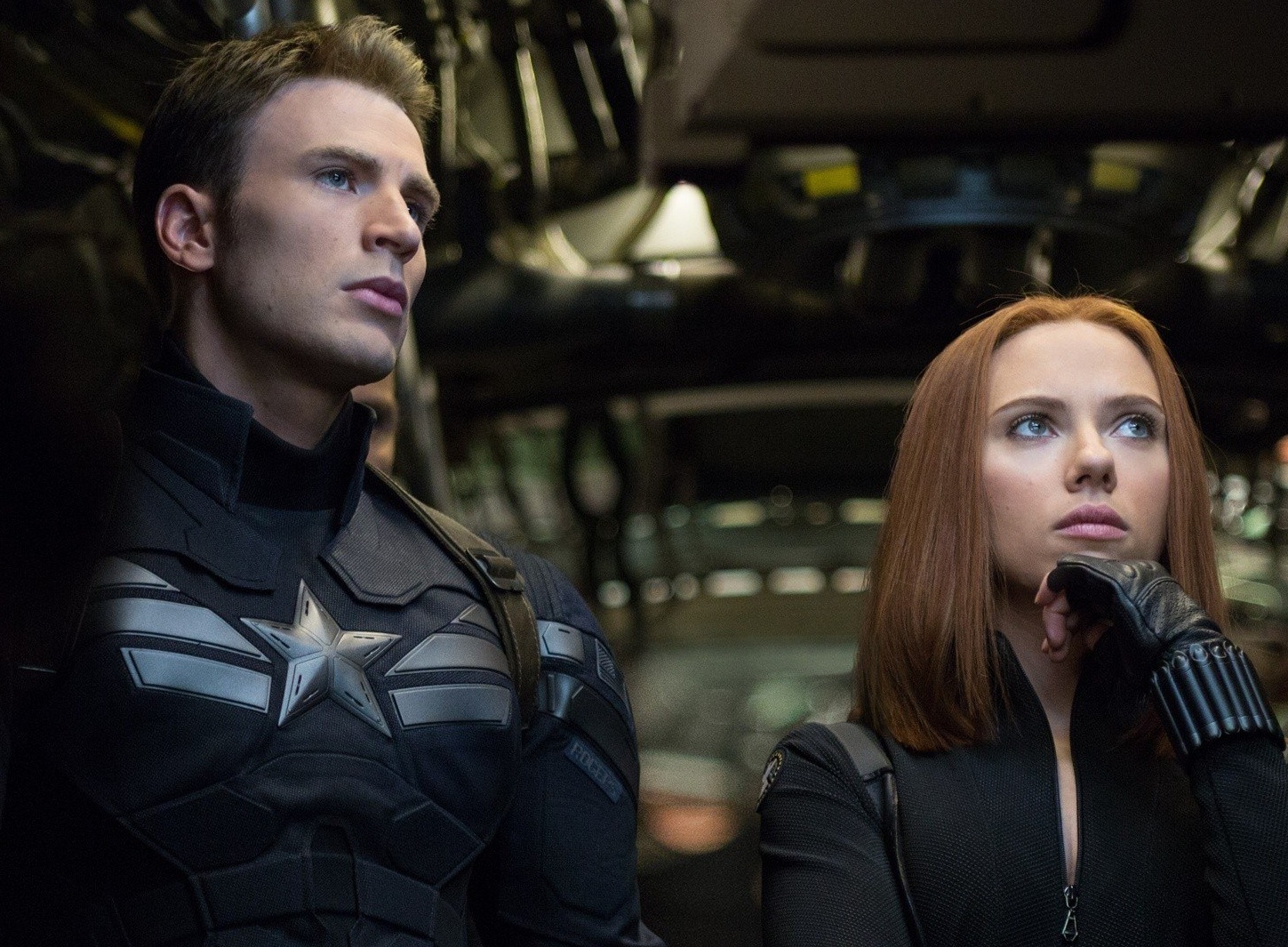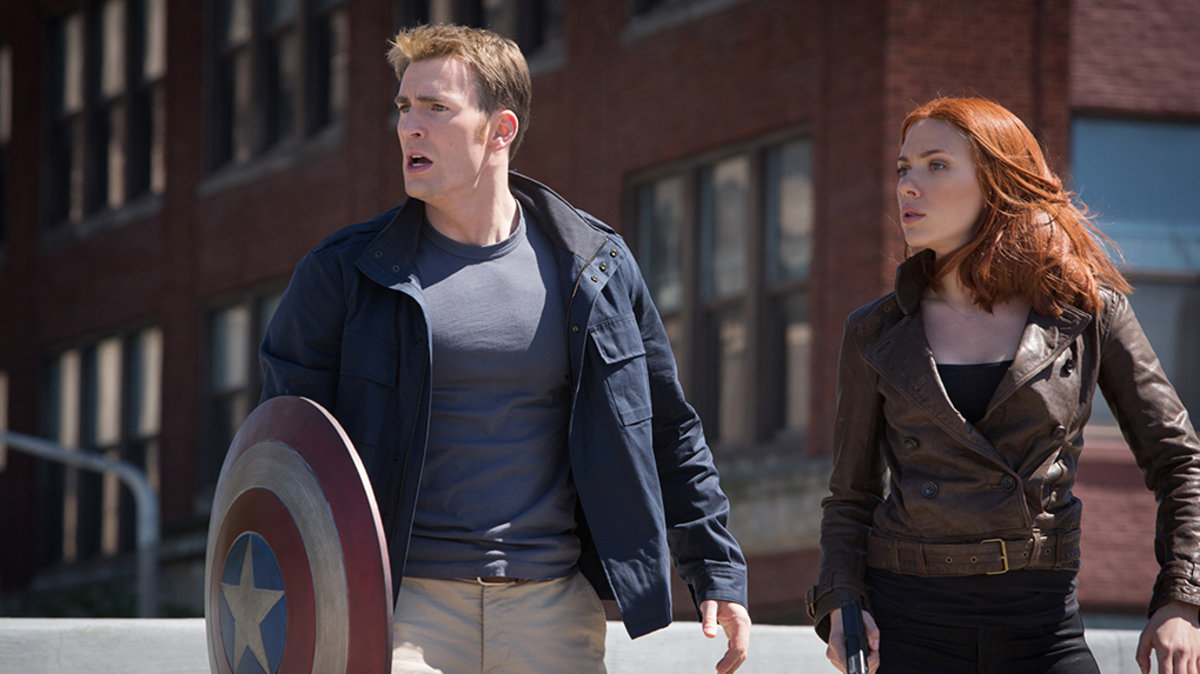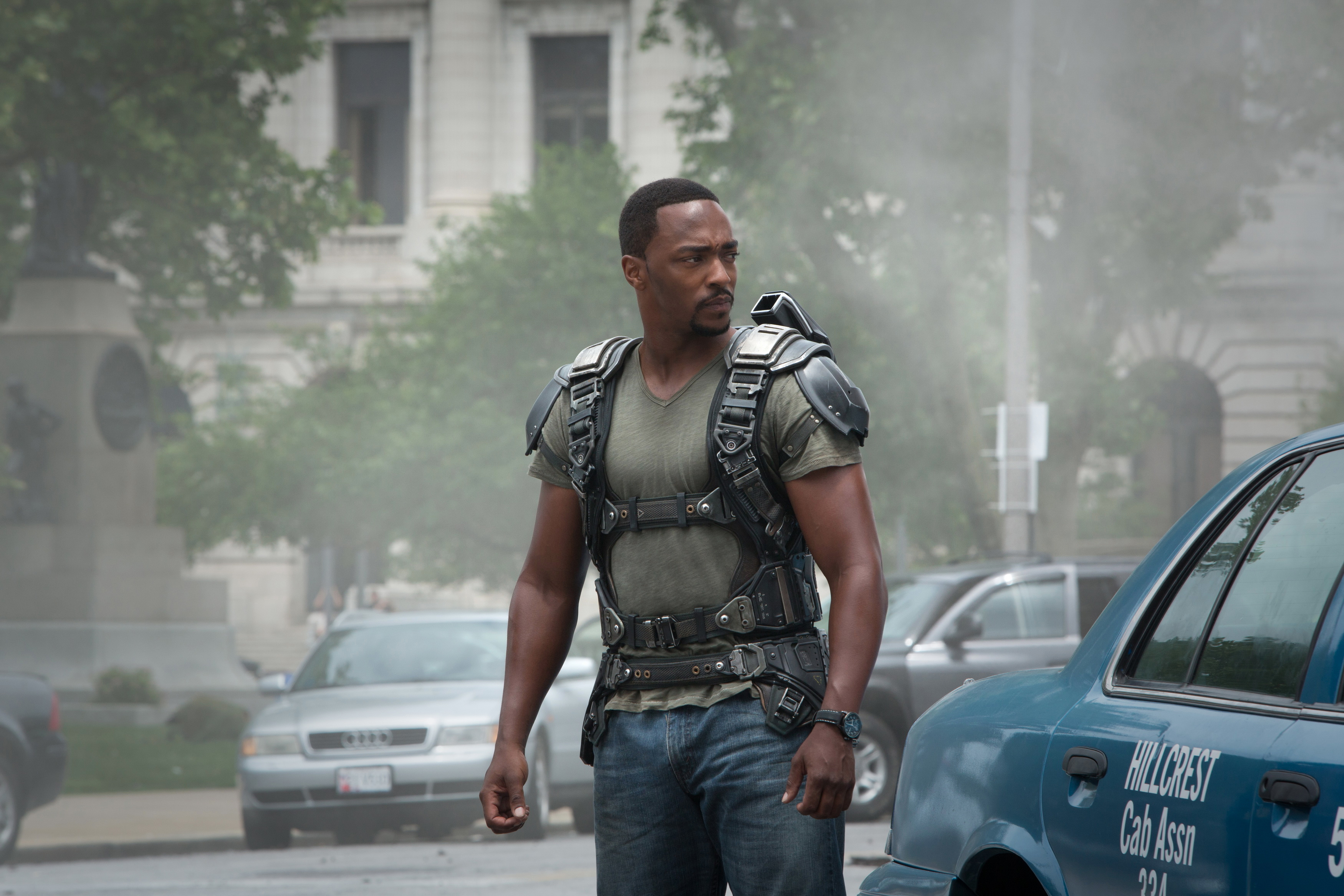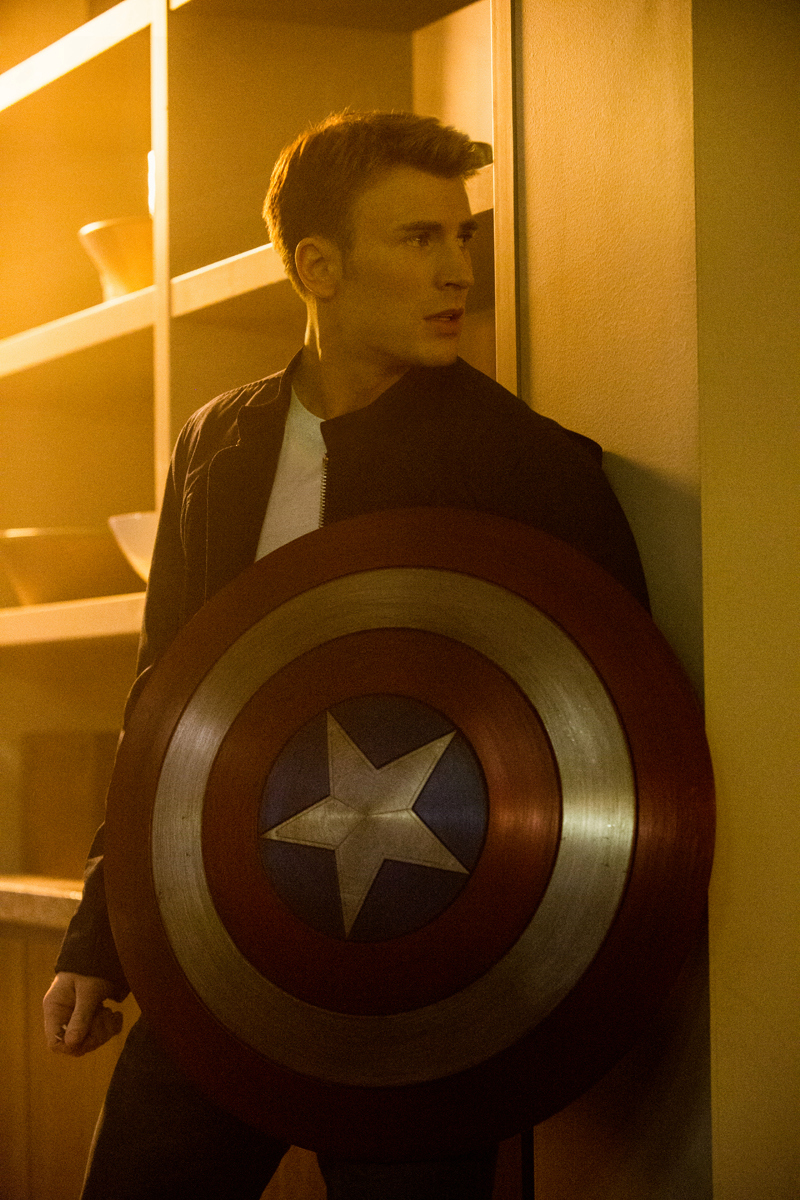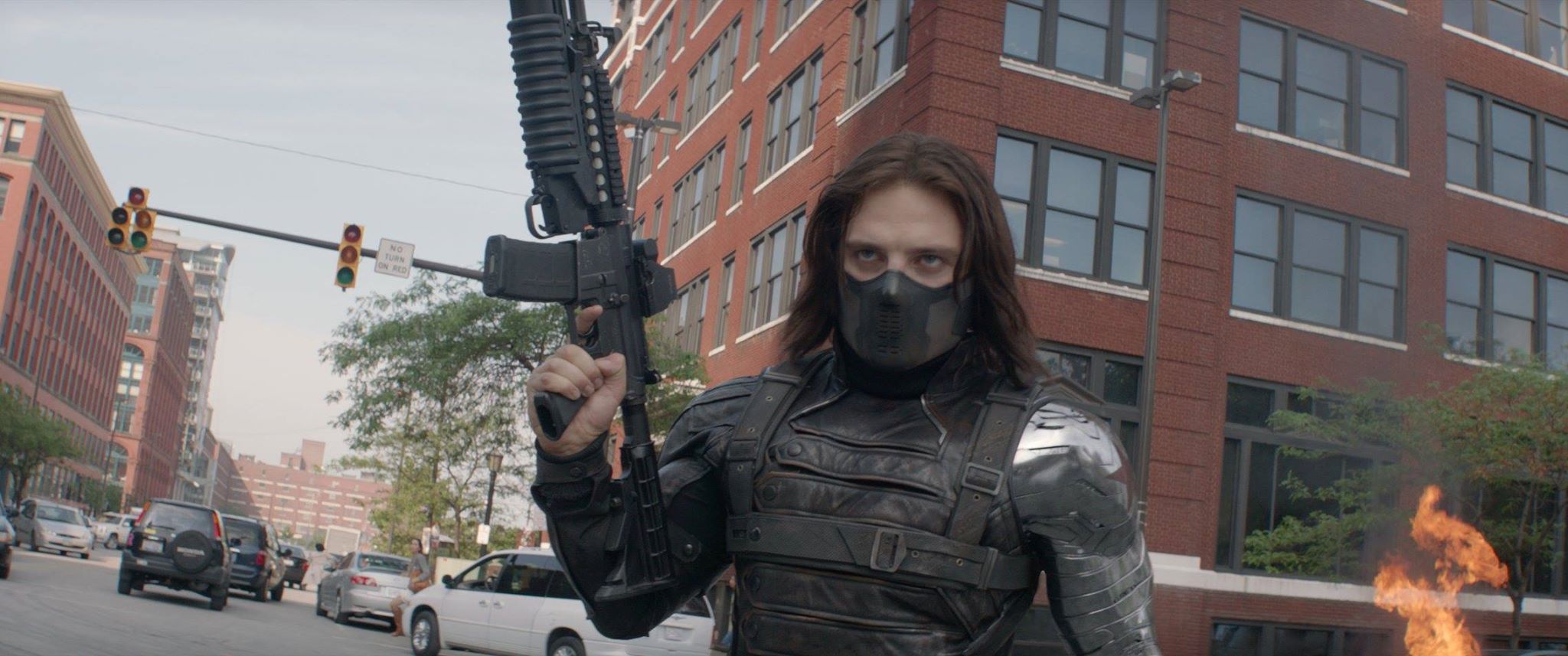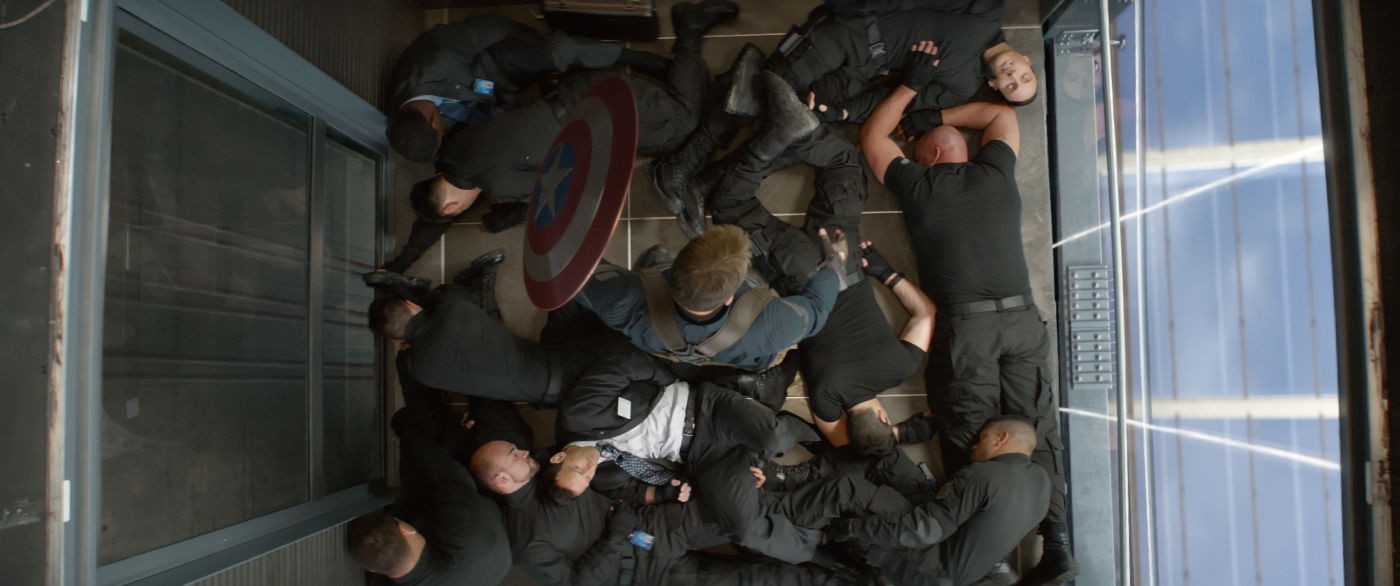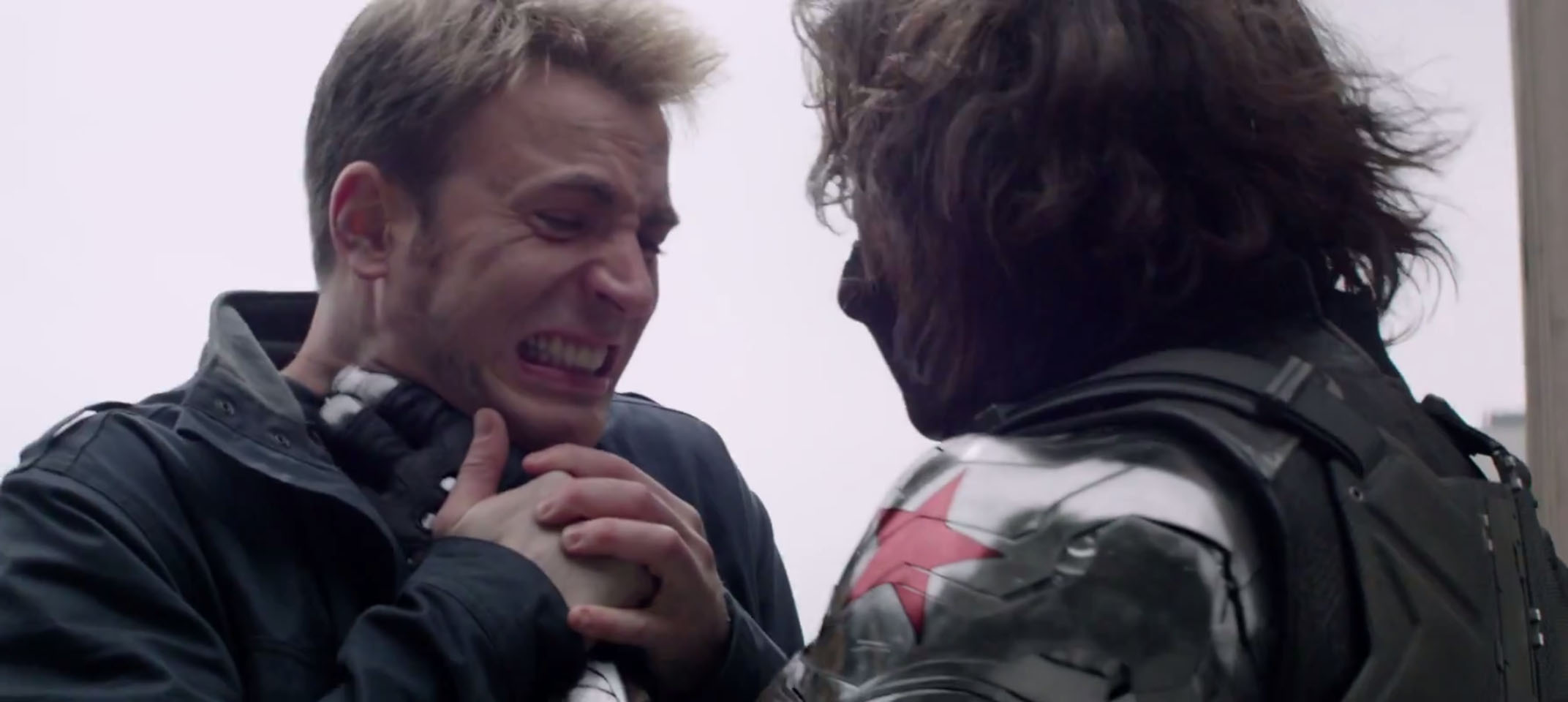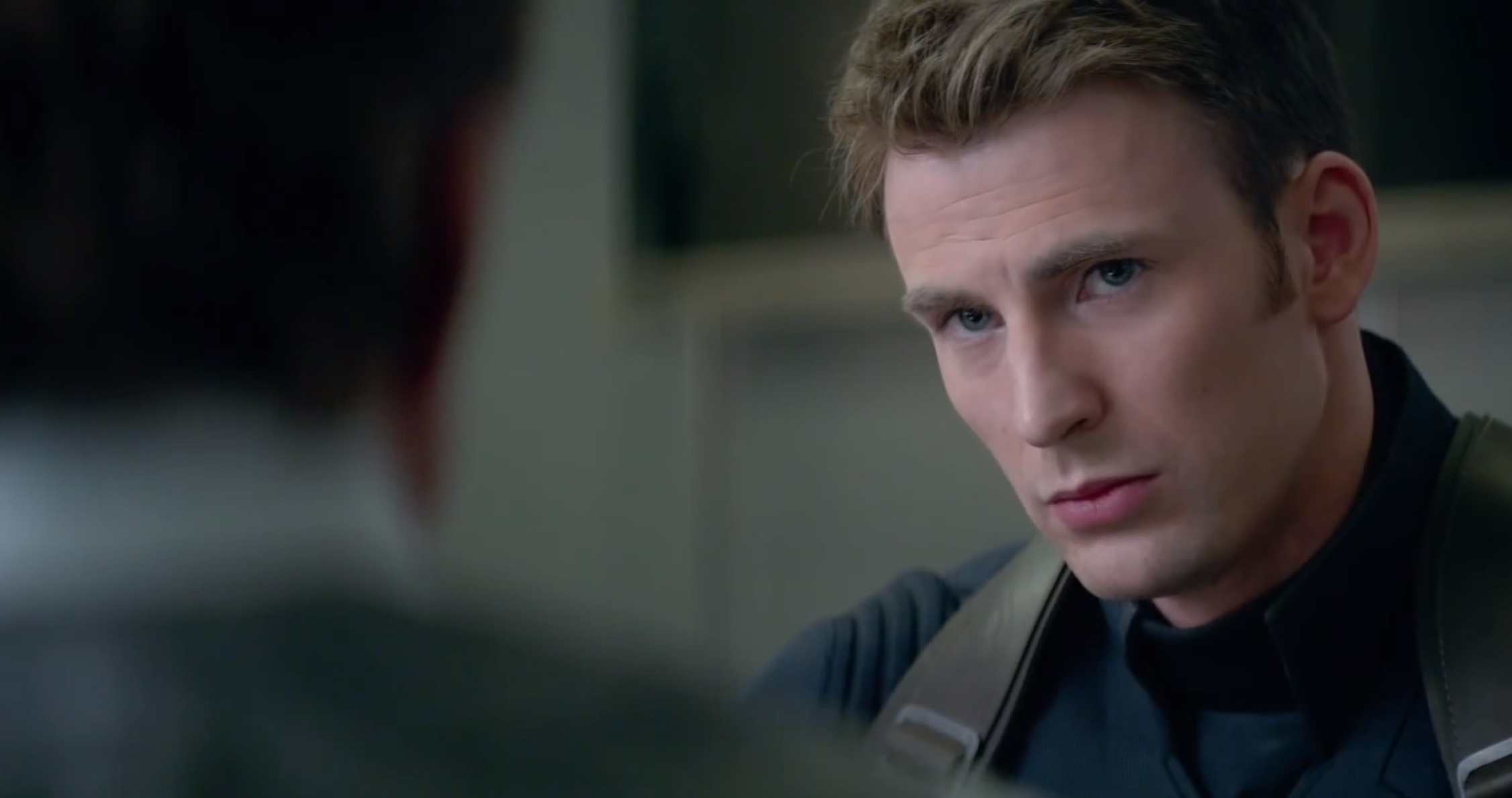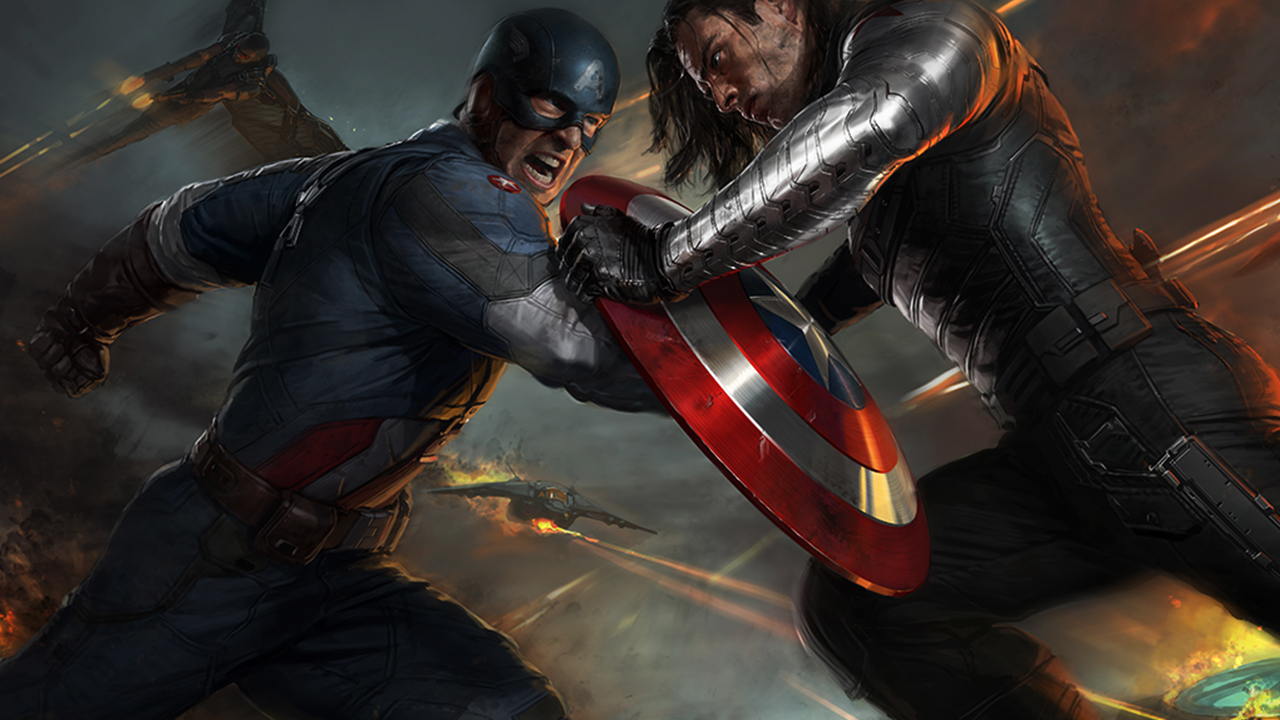Captain America: The Winter Soldier is the best Marvel Studios solo superhero flick since the debuting Iron Man. If that’s all you need to know, then there you have it. Go see it!
It’s fulfilling to see such an excellent sophomore effort for Cap as well, given the vast under-appreciation of the sequel’s ambitious WWII-set predecessor, 2011’s Captain America: The First Avenger. Still stuck in the modern world after helping to fight the landmark alien threat that founded the driving conflict of The Avengers, Captain America has since become a high-ranking member of spy organization, S.H.I.E.L.D., routinely undertaking espionage missions with fellow Avenger, Black Widow, and all the while struggling with a new tech-driven world of moral ambiguity and secrets.
Being an old-fashioned hero inspired by the more clear-cut conflict against the Nazis and their special research squadron, HYDRA from the first Cap movie, Captain America: The Winter Soldier allows the titular protagonist to achieve his full potential by beautifully capitalizing on the modern political allegory of sacrificing freedom for security. While it is already a smarter and more memorable Marvel Studios blockbuster in this respect however, the movie still includes plenty of action-packed thrills, as well as the sharp and witty sense of humour that Marvel Studios flicks continue to pull off with aplomb.
This sequel may be a more traditional Marvel Studios blockbuster this time, no longer set in the affairs of WWII or Asgard, but it’s nonetheless a show-stopping event that presents the highlight of Marvel Studios’ Phase Two offerings thus far. Captain America: The Winter Soldier not only provides a fun and engaging superhero blockbuster on its own merits, but also carries with it a wonderfully intense storyline that ends with far-reaching consequences for the Marvel Cinematic Universe at large, perfectly laying some gripping groundwork for next year’s Phase Two climax, The Avengers: Age of Ultron.
While avid Marvel enthusiasts will certainly get the most out of the experience, particularly with so many small hints and nods to future movie developments littered throughout the script yet again, even those who barely know anything about Marvel canon beyond The Avengers and at least some of Captain America: The First Avenger will love the terrific mix of suspense, action and wit in Marvel Studios’ latest must-see spectacle!
One particular strength that Marvel Studios’ Phase Two movies have really pulled off is effectively showcasing how several Marvel heroes have been affected by the battle they had to fight together in The Avengers. Iron Man 3 effectively detailed Tony Stark’s world shattering at the existence of otherwordly forces, thus leading to severe PTSD and a loss of his sense of identity. Likewise, Thor: The Dark World effectively demonstrated Thor’s struggle with his place as protector of the Nine Realms, following the aftermath of his brother, Loki’s invasion, and the emergence of a pressing threat which reminded Thor that there are bigger dangers to the universe beyond his scheming brother.
The difference with Iron Man and Thor however is that they could at least go back to the worlds they knew and understood after stopping Loki in The Avengers. Captain America on the other hand can never go back to his own time. He’s forced to try and make the best of things in a world of greys and uncertainties, one that he no longer understands. Who are the real enemies in such a paranoid, technology-driven landscape? Who can be trusted in an organization thriving on secrets and lies?
These interesting questions immediately have the sequel’s character work start off on a strong note. It’s not long before Cap and S.H.I.E.L.D. boss, Nick Fury start butting heads over freedom and its cost too. Fury sees Cap as an out-of-touch idealist who doesn’t see the modern world for what it is, while Cap feels that Fury and his underlings have contributed to the modern world losing its way in a quest for information dominance. Neither party is portrayed as being wholly right or wrong, allowing the viewer to interpret for themselves whether spying and invasion of basic trust and discretion is the necessary price for the modern society that we live in today.
Things really kick off however when S.H.I.E.L.D. is threatened by the titular antagonist, The Winter Soldier. Marvel fans know of this character’s identity and his connection to Captain America (one of the posters even shows him without his mask, potentially giving away a twist for less informed Marvel movie fans), but even if you don’t, he quickly becomes a worthy foe to Cap. He’s potentially faster, stronger, smarter, and has a metal arm to compensate for Cap’s boomerang-like vibranium shield. Worse than that however is that his agenda is largely unknown, beyond it spelling trouble for S.H.I.E.L.D.
On paper, Winter Soldier is a great villain that presents a marked improvement over the rather shallow portrayal of Malekith and the Dark Elves in Thor: The Dark World. Unfortunately however, given that Winter Soldier is quickly revealed to be a mindless henchman for a much greater evil, it somewhat ruins a bit of potential for an interesting conflict with his character. In fact, at worst, Winter Soldier often feels sidelined in his own movie, presenting a conflict for Captain America that feels too often shoved into the background, making the inevitable ‘reveal’ of his identity a bit underwhelming, and a genuine head-scratcher for anyone who hasn’t seen Captain America: The First Avenger.
Fortunately, what compensates is the mid-movie twist that immediately turns the entire Marvel Cinematic Universe on its ear, painting every character in a new light, and shuffling many ideas of who the heroes and villains may actually be in the whole mix. This makes it difficult to discuss many of the characters in Captain America: The Winter Soldier without considerable spoilers, but it does lead to interesting and engaging character development that effectively keeps the audience guessing for at least the first two acts of the story.
Of the new faces though, Anthony Mackie’s Sam Wilson is easily the highlight. Marvel fans likely know Wilson as Cap’s wing-suited-sidekick, Falcon, the first mainstream African-American character in comics back in the 1970’s. Even before he inevitably dons his flying suit, Wilson is an uplifting, supportive and immediately likeable presence in the sequel, even when the stakes get high. Of course, the character only gets better when he does don the Falcon wings, making him just as enjoyable as a capable flying soldier in several dizzying and highly entertaining action scenes.
There’s a large cast at work in Captain America: The Winter Soldier, but the movie does a great job of presenting a key conflict that creates ripples throughout all of the personalities. Not everyone is what they seem in this sequel, but every personality is noteworthy and feels genuinely compelling, be they ultimately good or evil. This makes for some of Marvel Studios’ most interesting character studies yet, and immediately elevates the character work beyond the more straightforward popcorn-ish personalities of Captain America: The First Avenger.
As you can imagine, a lot happens in Captain America: The Winter Soldier. The story avoids being too dense or unsettling, and carefully finds room to breathe and continue having fun with the Marvel personalities when it’s appropriate and necessary, but this is still one of the more political and interpretive movies that Marvel Studios has yet made, one that also packs a rather relentless pace much of the time.
As mentioned, the movie’s incredible key conflict is no small affair. It shakes the entire Marvel Cinematic Universe at its core once it’s revealed. The implications will no doubt be felt on sibling television series, Agents of S.H.I.E.L.D., let alone the upcoming The Avengers: Age of Ultron, and it’s clear that Cap will find himself further lost and confused in a frightening new world, even after battling gods and aliens in The Avengers. Put simply, it’s great stuff that leaves an especially heavy impact in contrast to most other Marvel Studios movies.
The movie hits the ground running by showcasing Cap’s work with S.H.I.E.L.D. and Black Widow, thanks to an impressive opening action scene set on a freighter in international waters. The audience shares Cap’s journey, as a seemingly routine op is revealed to have more behind it, leading to a gradual unfurling of a deep-rooted conspiracy that has compromised S.H.I.E.L.D. itself. Needless to say, a pure and idealistic hero like Cap is the only person that can set things right.
Again, it’s difficult to talk about much of the movie’s storyline without spoilers, as Captain America: The Winter Soldier is a sequel rife with twists and turns. Character allegiances can switch at any moment. Some characters die unexpectedly. Some developments in the Marvel Cinematic Universe come out of left field. There will likely be a good chunk of plot turns in this sequel that even hardcore Marvel fans won’t be able to predict.
It’s all effectively executed however, and the story feels like it’s constantly firing on all cylinders in terms of quality and entertainment. The third act leads up to a lengthy and large-scale climax for the fate of S.H.I.E.L.D. and what it stands for, and sidelines many of the interesting political elements in favour of more raw action and destruction, but by then, the final battle feels very exciting to watch, given the movie’s effective journey to it.
The conclusion to the arc of Winter Soldier himself is at least satisfying as well, even if he feels overshadowed by the agenda of his masters. Winter Soldier may sometimes come off as feeling like too much of a pawn, but the movie doesn’t really waste him by any means either. His inevitable climactic scrap with Cap is as emotional as it is powerful, and the denouement after said battle is another effective surprise that fans may not expect, one that also teases that his battle with both Cap and himself doesn’t simply end with the credits.
Oh, and speaking of the credits, Captain America: The Winter Soldier, like Thor: The Dark World before it, contains two post-credit scenes. As before, the mid-credits scene presents a teasing first look at one of the plot directions for a future Marvel Studios movie, in this case being a direct lead-in to The Avengers: Age of Ultron, while the scene taking place after all of the credits simply provides a bit of added closure for one of the sequel’s key characters, at least for this point.
Regardless however, there aren’t any points in Captain America: The Winter Soldier where the story feels weak or dull. It’s one of the best Marvel Studios plots yet, and its impact will certainly continue to be felt in future Marvel Cinematic Universe stories!
You would be remarkably surprised when viewing the final product of Captain America: The Winter Soldier, when you consider that its co-directors are Joe and Anthony Russo. These two haven’t done a feature film since 2006’s mostly-hated You, Me and Dupree, and have largely stuck to both producing and directing television comedies, namely Community and Happy Endings. That’s not a promising resume for a large-scale Marvel Studios blockbuster on paper.
Nonetheless, the Russo brothers apparently pleased Marvel Studios so much with Captain America: The Winter Soldier’s final product, that the studio is already wanting to hire them again for 2016’s untitled third Captain America movie, a release plan that Marvel has since verified after an initial leak. It’s plain to see why, as Captain America: The Winter Soldier is a fantastically directed and polished blockbuster that continues to justify Marvel Studios’ famously offbeat director choices.
The Russo brothers’ background in comedy lends itself well to the script’s surprisingly effective and well-timed funny moments, but even during the movie’s awesome action scenes, the co-directors routinely rise to the occasion. After the immediately gripping freighter opener, you’ll see plenty of creativity and excitement throughout the other major action scenes. These include the much-teased ultra-close-quarters skirmish in an elevator, and the high-flying helicarrier climax that feels like a genuine thrill ride when viewed from the perspective of Falcon’s speeding flight suit.
Every moment is executed brilliantly, every angle is planned perfectly, and everything is directed with maximum effect in Captain America: The Winter Soldier. It doesn’t matter what kind of moment it is. It all works. Sure, the enjoyable performances and great writing can be thanked for that too, but it’s the Russo brothers’ directing that really gives the movie its sense of both power and charm, throughout the entirety of its duration.
Captain America: The Winter Soldier has a typically heroic and symphonic score composed by Henry Jackman. It fits the movie well, though it’s often difficult to make out amidst all of the flying fists and powerful explosions that litter every action scene. A few of the wide shots are accompanied by sweeping scores, which work, though it’s not dissimilar to the same kind of tunes you would hear in any other traditional Marvel Studios blockbuster.
The sound mixing and reverberating power behind every super-powered strike and every inch of carnage that Washington D.C. suffers is very potent however. Combined with the decreased need for CGI and the exceptionally-directed action, the movie constantly feels intense and exciting to listen to, even without added visual bells and whistles.
Despite being a Marvel Studios blockbuster, you may be surprised (or perhaps not, given Cap’s well-established physical abilities) to see that much of Captain America: The Winter Soldier isn’t effects-heavy. A lot of it relies on hand-made stunt work, leading to action that feels more real and hard-hitting than the majority of superhero movies. Audiences will effectively feel the strength and conviction behind Cap’s blows, particularly when he battles against the equally powerful Winter Soldier.
The one instance where CGI is more heavily incorporated into the mostly purely physical action is when Falcon enters the mix. Fortunately, it still looks incredible, as the shots of Sam Wilson speeding around, firing SMG’s and deploying missile flares from his Falcon wings feel turbo-charged and very exciting! Watching both Cap and Falcon alike take out entire vehicles and platoons of foot soldiers in the more CGI-heavy scenes is still a force to be reckoned with, even if it’s the many up-close-and-personal sequences of fisticuffs that will really get the audience’s blood pumping, despite so many frequent explosions and often widespread environmental damage.
Even without the added flair of Iron Man’s technology or Thor’s magic, Captain America: The Winter Soldier still feels visually stimulating and grand in scale. In fact, the only place where the effects are routinely let down is, as expected, with the 3D and IMAX elements. I would know, given that I sprang to see the IMAX 3D cut of the movie.
This seems to be a common weakness with the otherwise strong triad of Phase Two movie offerings thus far, all being very polished and well-crafted sequels with superb special effects, but also suffering from really lacklustre 3D and IMAX effects. Sadly, Captain America: The Winter Soldier continues this failing, despite the surprisingly solid 3D work in the previous Captain America: The First Avenger.
At the very least, Captain America: The Winter Soldier contains a few more 3D-enhanced scenes than the largely non-existent 3D in Iron Man 3 and Thor: The Dark World, namely in the mid-air action sequences incorporating Falcon. Most of the time however, the 3D just hangs there and isn’t put to any use, even when it would have made sense during several action moments. The 3D is there at the very least, but it’s a slapdash post-conversion that largely feels lazy and spotty. If you’d rather save the money, you don’t lose anything by just watching the movie flat in a standard 2D digital screening.
Likewise, the movie does absolutely nothing with its IMAX presentation, making that cut especially not worth the money. Again, a few of the mid-air wide shots benefit slightly from IMAX, but not enough for the hefty added price. You’re still better off just sticking with a regular 2D ticket for the most part.
Fortunately, the actual stunts and special effects that were put on display aside from the 3D and IMAX post-conversion are excellent all-around, especially with a chance to depend less on CGI this time, and more on skilled directing complemented with equally skilled action choreography.
Captain America: The Winter Soldier is a massive overall success for Marvel Studios, and one of the best movies they’ve turned out yet! Fans of the title antagonist may wish that he was a more automated threat, but the excellent conception and execution of this inspired follow-up is superb not just in the moments of its own runtime, but also in shaping the immediate future of the Marvel Cinematic Universe.
This sequel not only provides a second solo big screen outing for Cap that noticeably outclasses his already-entertaining first, but also hints at lots of promise for the next handful of stories that the Marvel Cinematic Universe is set to deliver. Even with two strong post-Avengers sequels to precede it, both improvements over the solo movies that came before them as well, Captain America: The Winter Soldier brings a healthy Phase Two lineup of Marvel Studios movies to a new high!
One can only hope that this positive momentum is maintained in August’s especially eccentric, but no less promising Marvel Studios blockbuster to come, Guardians of the Galaxy. Regardless however, this current offering presents plenty to look forward to as it begins to set things properly into motion for The Avengers: Age of Ultron, entertaining moviegoers at length on its own merits, but especially teasing plenty of great events to come for avid Marvel enthusiasts.
This may be our first major superhero blockbuster of 2014, but it’s already presented an incredibly tough act to follow. There may be dark times ahead for the actual personalities of the Marvel Cinematic Universe, but for Marvel Studios, the future has rarely looked brighter!

